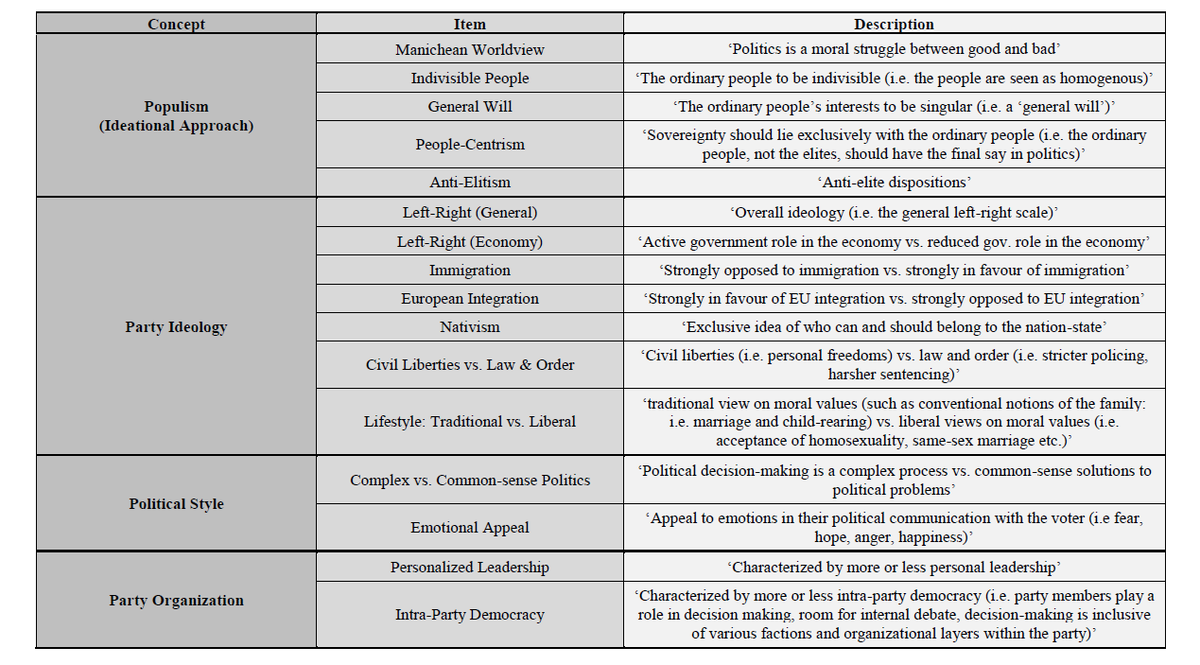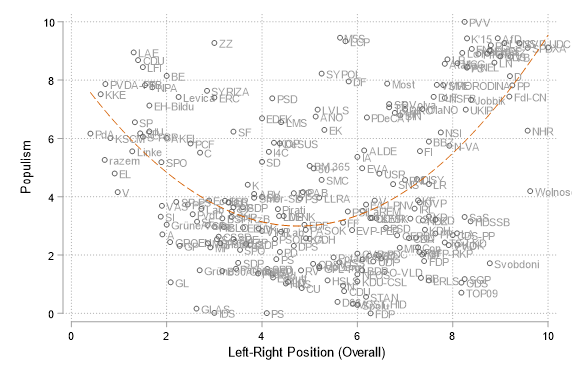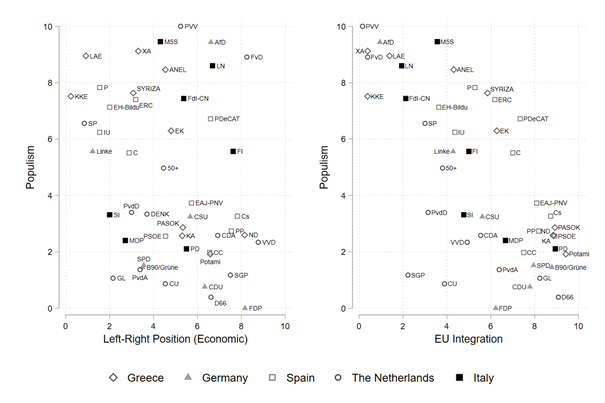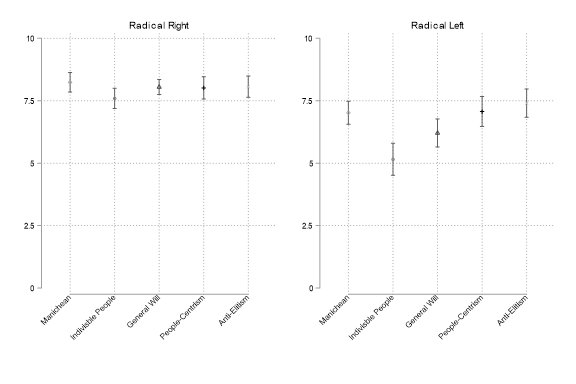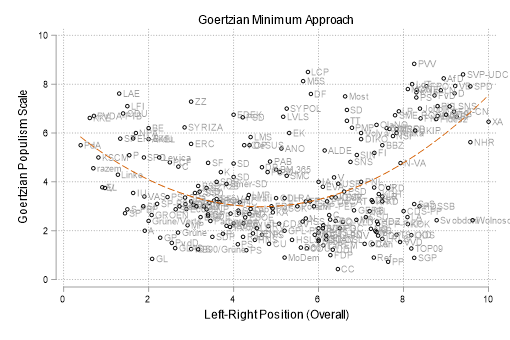Very pleased that my paper with @AndrejZaslove "Measuring Populism in Political Parties: Appraisal of a New Approach" has been accepted for publication in #ComparativePoliticalStudies! In the paper, outline and test our continuous measure of parties& #39; populism. A thread  https://abs.twimg.com/emoji/v2/... draggable="false" alt="👇" title="Down pointing backhand index" aria-label="Emoji: Down pointing backhand index"> 1/12
https://abs.twimg.com/emoji/v2/... draggable="false" alt="👇" title="Down pointing backhand index" aria-label="Emoji: Down pointing backhand index"> 1/12
Using data from our Populism and Political Parties Expert Survey (POPPA , @poppa_data), we argue and demonstrate that parties& #39; populism best measures as a continuous, latent variable. We provide a measure of populism for 250 political parties in 28 European countries. 2/12
Based on 294 expert judgments (34 % response rate), we operationalize populism in a multidimensional way with five items. IRT and exploratory factor analyses provide strong evidence that the 5 items constitute the latent construct of populism. 3/12
Besides our five populism measures, the expert survey includes 11 other items that measure party ideology, style, and organization, as the table below shows. All items were measured on a 0-10 scale, and whenever possible in keeping with the item-wording of the @ches_data. 4/12
Our data, which is now publicly available via #HarvardDataverse, opens up many possibilities for scholars of populism. For instance, can we examine the relationship between populism and other ideological variables, as the plot below shows. 5/12
We argue that one of the key benefits of our continuous approach concerns & #39;borderline cases& #39;. Parties such as @DieLinke, @SPnl, @de_NVA, or @forza_italia are sometimes classified as populist, and sometimes not. Our data shows these parties moderately populist 6/12.
The data also allow us to gauge differences in parties& #39; populism. For instance, we see that while both radical left and radical right parties score high on the 5 items used to measure populism, the radical left scores lower on anti-pluralist items 7/x
As the data is publicly available, scholars are free to use the data as they see fit. While we prefer measuring populism in a continuous way in line w/ ideational approach as a 5-item latent construct, scholars can also include item regarding political style or organization 8/12
Scholars can also choose to employ different aggregation methods, such as the Goertzian, necessary conditions approach outlined by @Kunkakom @ChristianSchim @haraldschoen. 9/12
The CPS paper provides many more analyses as well as comparisons with the @ches_data as well as Global Populism Database ( @PopulismTeam) and the Popu-List ( http://popu-list.org"> http://popu-list.org ) 10/12
Data is now publicly available at Harvard Dataverse ( https://doi.org/10.7910/DVN/8NEL7B).">https://doi.org/10.7910/D... We provide both party-level data (mean / median expert judgments) as well as expert level data. Pre-print + appendix of the CPS manuscript can be found here: http://maurits-meijers.eu/?page_id=25 .">https://maurits-meijers.eu/... 11/12
We are incredibly indebted to our amazing research assistants at @RadboudNSM as well as the many colleagues who have provides us with feedback and advice. Thank you! 12/12

 Read on Twitter
Read on Twitter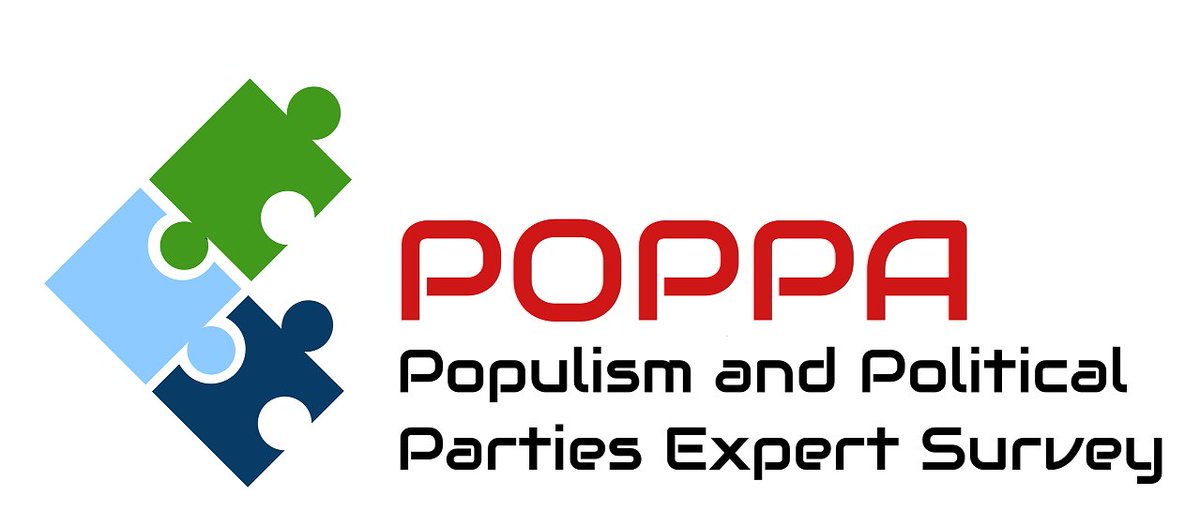 1/12" title="Very pleased that my paper with @AndrejZaslove "Measuring Populism in Political Parties: Appraisal of a New Approach" has been accepted for publication in #ComparativePoliticalStudies! In the paper, outline and test our continuous measure of parties& #39; populism. A thread https://abs.twimg.com/emoji/v2/... draggable="false" alt="👇" title="Down pointing backhand index" aria-label="Emoji: Down pointing backhand index"> 1/12" class="img-responsive" style="max-width:100%;"/>
1/12" title="Very pleased that my paper with @AndrejZaslove "Measuring Populism in Political Parties: Appraisal of a New Approach" has been accepted for publication in #ComparativePoliticalStudies! In the paper, outline and test our continuous measure of parties& #39; populism. A thread https://abs.twimg.com/emoji/v2/... draggable="false" alt="👇" title="Down pointing backhand index" aria-label="Emoji: Down pointing backhand index"> 1/12" class="img-responsive" style="max-width:100%;"/>
